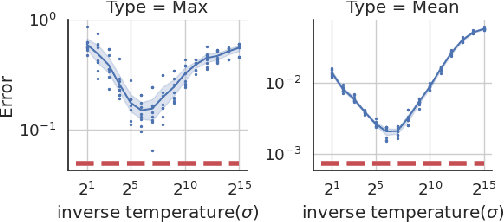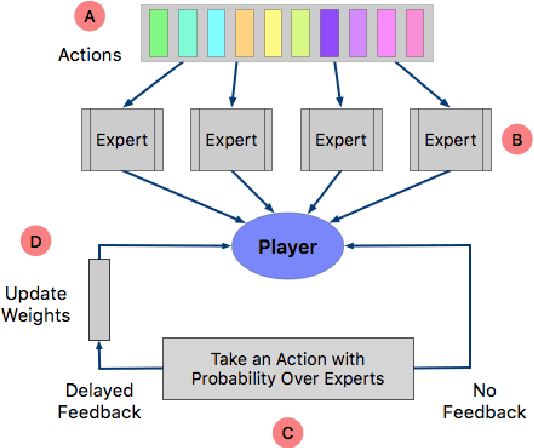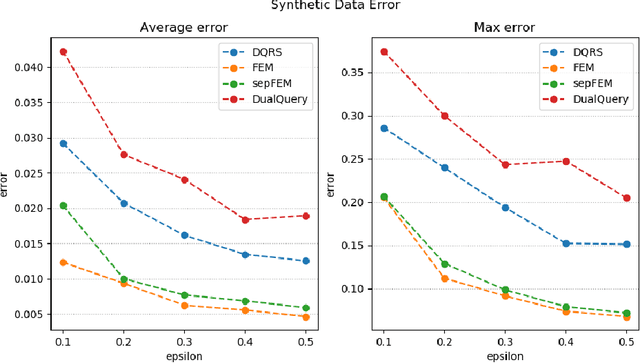Giuseppe Vietri
Auto-GDA: Automatic Domain Adaptation for Efficient Grounding Verification in Retrieval Augmented Generation
Oct 04, 2024



Abstract:While retrieval augmented generation (RAG) has been shown to enhance factuality of large language model (LLM) outputs, LLMs still suffer from hallucination, generating incorrect or irrelevant information. One common detection strategy involves prompting the LLM again to assess whether its response is grounded in the retrieved evidence, but this approach is costly. Alternatively, lightweight natural language inference (NLI) models for efficient grounding verification can be used at inference time. While existing pre-trained NLI models offer potential solutions, their performance remains subpar compared to larger models on realistic RAG inputs. RAG inputs are more complex than most datasets used for training NLI models and have characteristics specific to the underlying knowledge base, requiring adaptation of the NLI models to a specific target domain. Additionally, the lack of labeled instances in the target domain makes supervised domain adaptation, e.g., through fine-tuning, infeasible. To address these challenges, we introduce Automatic Generative Domain Adaptation (Auto-GDA). Our framework enables unsupervised domain adaptation through synthetic data generation. Unlike previous methods that rely on handcrafted filtering and augmentation strategies, Auto-GDA employs an iterative process to continuously improve the quality of generated samples using weak labels from less efficient teacher models and discrete optimization to select the most promising augmented samples. Experimental results demonstrate the effectiveness of our approach, with models fine-tuned on synthetic data using Auto-GDA often surpassing the performance of the teacher model and reaching the performance level of LLMs at 10 % of their computational cost.
Generating Private Synthetic Data with Genetic Algorithms
Jun 05, 2023



Abstract:We study the problem of efficiently generating differentially private synthetic data that approximate the statistical properties of an underlying sensitive dataset. In recent years, there has been a growing line of work that approaches this problem using first-order optimization techniques. However, such techniques are restricted to optimizing differentiable objectives only, severely limiting the types of analyses that can be conducted. For example, first-order mechanisms have been primarily successful in approximating statistical queries only in the form of marginals for discrete data domains. In some cases, one can circumvent such issues by relaxing the task's objective to maintain differentiability. However, even when possible, these approaches impose a fundamental limitation in which modifications to the minimization problem become additional sources of error. Therefore, we propose Private-GSD, a private genetic algorithm based on zeroth-order optimization heuristics that do not require modifying the original objective. As a result, it avoids the aforementioned limitations of first-order optimization. We empirically evaluate Private-GSD against baseline algorithms on data derived from the American Community Survey across a variety of statistics--otherwise known as statistical queries--both for discrete and real-valued attributes. We show that Private-GSD outperforms the state-of-the-art methods on non-differential queries while matching accuracy in approximating differentiable ones.
Confidence-Ranked Reconstruction of Census Microdata from Published Statistics
Nov 06, 2022Abstract:A reconstruction attack on a private dataset $D$ takes as input some publicly accessible information about the dataset and produces a list of candidate elements of $D$. We introduce a new class of data reconstruction attacks based on randomized methods for non-convex optimization. We empirically demonstrate that our attacks can not only reconstruct full rows of $D$ from aggregate query statistics $Q(D)\in \mathbb{R}^m$, but can do so in a way that reliably ranks reconstructed rows by their odds of appearing in the private data, providing a signature that could be used for prioritizing reconstructed rows for further actions such as identify theft or hate crime. We also design a sequence of baselines for evaluating reconstruction attacks. Our attacks significantly outperform those that are based only on access to a public distribution or population from which the private dataset $D$ was sampled, demonstrating that they are exploiting information in the aggregate statistics $Q(D)$, and not simply the overall structure of the distribution. In other words, the queries $Q(D)$ are permitting reconstruction of elements of this dataset, not the distribution from which $D$ was drawn. These findings are established both on 2010 U.S. decennial Census data and queries and Census-derived American Community Survey datasets. Taken together, our methods and experiments illustrate the risks in releasing numerically precise aggregate statistics of a large dataset, and provide further motivation for the careful application of provably private techniques such as differential privacy.
Private Synthetic Data for Multitask Learning and Marginal Queries
Sep 15, 2022



Abstract:We provide a differentially private algorithm for producing synthetic data simultaneously useful for multiple tasks: marginal queries and multitask machine learning (ML). A key innovation in our algorithm is the ability to directly handle numerical features, in contrast to a number of related prior approaches which require numerical features to be first converted into {high cardinality} categorical features via {a binning strategy}. Higher binning granularity is required for better accuracy, but this negatively impacts scalability. Eliminating the need for binning allows us to produce synthetic data preserving large numbers of statistical queries such as marginals on numerical features, and class conditional linear threshold queries. Preserving the latter means that the fraction of points of each class label above a particular half-space is roughly the same in both the real and synthetic data. This is the property that is needed to train a linear classifier in a multitask setting. Our algorithm also allows us to produce high quality synthetic data for mixed marginal queries, that combine both categorical and numerical features. Our method consistently runs 2-5x faster than the best comparable techniques, and provides significant accuracy improvements in both marginal queries and linear prediction tasks for mixed-type datasets.
Improved Regret for Differentially Private Exploration in Linear MDP
Feb 02, 2022Abstract:We study privacy-preserving exploration in sequential decision-making for environments that rely on sensitive data such as medical records. In particular, we focus on solving the problem of reinforcement learning (RL) subject to the constraint of (joint) differential privacy in the linear MDP setting, where both dynamics and rewards are given by linear functions. Prior work on this problem due to Luyo et al. (2021) achieves a regret rate that has a dependence of $O(K^{3/5})$ on the number of episodes $K$. We provide a private algorithm with an improved regret rate with an optimal dependence of $O(\sqrt{K})$ on the number of episodes. The key recipe for our stronger regret guarantee is the adaptivity in the policy update schedule, in which an update only occurs when sufficient changes in the data are detected. As a result, our algorithm benefits from low switching cost and only performs $O(\log(K))$ updates, which greatly reduces the amount of privacy noise. Finally, in the most prevalent privacy regimes where the privacy parameter $\epsilon$ is a constant, our algorithm incurs negligible privacy cost -- in comparison with the existing non-private regret bounds, the additional regret due to privacy appears in lower-order terms.
Iterative Methods for Private Synthetic Data: Unifying Framework and New Methods
Jun 14, 2021



Abstract:We study private synthetic data generation for query release, where the goal is to construct a sanitized version of a sensitive dataset, subject to differential privacy, that approximately preserves the answers to a large collection of statistical queries. We first present an algorithmic framework that unifies a long line of iterative algorithms in the literature. Under this framework, we propose two new methods. The first method, private entropy projection (PEP), can be viewed as an advanced variant of MWEM that adaptively reuses past query measurements to boost accuracy. Our second method, generative networks with the exponential mechanism (GEM), circumvents computational bottlenecks in algorithms such as MWEM and PEP by optimizing over generative models parameterized by neural networks, which capture a rich family of distributions while enabling fast gradient-based optimization. We demonstrate that PEP and GEM empirically outperform existing algorithms. Furthermore, we show that GEM nicely incorporates prior information from public data while overcoming limitations of PMW^Pub, the existing state-of-the-art method that also leverages public data.
Leveraging Public Data for Practical Private Query Release
Feb 17, 2021



Abstract:In many statistical problems, incorporating priors can significantly improve performance. However, the use of prior knowledge in differentially private query release has remained underexplored, despite such priors commonly being available in the form of public datasets, such as previous US Census releases. With the goal of releasing statistics about a private dataset, we present PMW^Pub, which -- unlike existing baselines -- leverages public data drawn from a related distribution as prior information. We provide a theoretical analysis and an empirical evaluation on the American Community Survey (ACS) and ADULT datasets, which shows that our method outperforms state-of-the-art methods. Furthermore, PMW^Pub scales well to high-dimensional data domains, where running many existing methods would be computationally infeasible.
EXP4-DFDC: A Non-Stochastic Multi-Armed Bandit for Cache Replacement
Sep 25, 2020
Abstract:In this work we study a variant of the well-known multi-armed bandit (MAB) problem, which has the properties of a delay in feedback, and a loss that declines over time. We introduce an algorithm, EXP4-DFDC, to solve this MAB variant, and demonstrate that the regret vanishes as the time increases. We also show that LeCaR, a previously published machine learning-based cache replacement algorithm, is an instance of EXP4-DFDC. Our results can be used to provide insight on the choice of hyperparameters, and optimize future LeCaR instances.
Private Reinforcement Learning with PAC and Regret Guarantees
Sep 18, 2020
Abstract:Motivated by high-stakes decision-making domains like personalized medicine where user information is inherently sensitive, we design privacy preserving exploration policies for episodic reinforcement learning (RL). We first provide a meaningful privacy formulation using the notion of joint differential privacy (JDP)--a strong variant of differential privacy for settings where each user receives their own sets of output (e.g., policy recommendations). We then develop a private optimism-based learning algorithm that simultaneously achieves strong PAC and regret bounds, and enjoys a JDP guarantee. Our algorithm only pays for a moderate privacy cost on exploration: in comparison to the non-private bounds, the privacy parameter only appears in lower-order terms. Finally, we present lower bounds on sample complexity and regret for reinforcement learning subject to JDP.
New Oracle-Efficient Algorithms for Private Synthetic Data Release
Jul 10, 2020
Abstract:We present three new algorithms for constructing differentially private synthetic data---a sanitized version of a sensitive dataset that approximately preserves the answers to a large collection of statistical queries. All three algorithms are \emph{oracle-efficient} in the sense that they are computationally efficient when given access to an optimization oracle. Such an oracle can be implemented using many existing (non-private) optimization tools such as sophisticated integer program solvers. While the accuracy of the synthetic data is contingent on the oracle's optimization performance, the algorithms satisfy differential privacy even in the worst case. For all three algorithms, we provide theoretical guarantees for both accuracy and privacy. Through empirical evaluation, we demonstrate that our methods scale well with both the dimensionality of the data and the number of queries. Compared to the state-of-the-art method High-Dimensional Matrix Mechanism \cite{McKennaMHM18}, our algorithms provide better accuracy in the large workload and high privacy regime (corresponding to low privacy loss $\varepsilon$).
 Add to Chrome
Add to Chrome Add to Firefox
Add to Firefox Add to Edge
Add to Edge